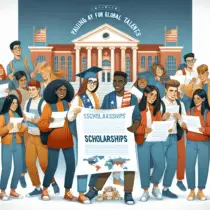Unlocking Opportunities: Embracing Scholarships for Online Learning Success
Introduction
In today’s rapidly evolving world, online learning has become a game-changer for individuals seeking to enhance their knowledge and skills. The convenience, flexibility, and accessibility of online education have opened doors to countless opportunities. However, the cost of pursuing online courses can often be a barrier for many individuals. That’s where scholarships for online learning come in. These financial aids can help students overcome financial constraints and unlock the full potential of online education.
What are Scholarships for Online Learning?
Scholarships for online learning are monetary awards granted to students pursuing education through digital platforms. These scholarships are specifically designed to support individuals who want to leverage the benefits of online education but may not have the means to do so. They cover tuition fees, course materials, and other related expenses, enabling students to focus on their studies without worrying about the financial burden.
Types of Online Learning Scholarships
1. Merit-Based Scholarships: These scholarships are awarded based on academic achievements, such as high grades or exceptional performance in specific subjects. Merit-based scholarships recognize students’ hard work and dedication by providing them with financial support to pursue their educational goals.
2. Need-Based Scholarships: Need-based scholarships consider an individual’s financial circumstances as the primary factor in determining eligibility. These scholarships aim to provide assistance to students from low-income households or those facing economic hardships.
3. Subject-Specific Scholarships: Some scholarships target students pursuing specific fields or subjects of study. For example, there may be scholarships available exclusively for students interested in technology, healthcare, or business-related courses.
4. Diversity Scholarships: Many scholarship programs focus on promoting diversity and inclusion by supporting underrepresented groups in higher education, including racial and ethnic minorities, women in STEM fields, LGBTQ+ individuals, and individuals with disabilities.
Benefits of Online Learning Scholarships
1. Accessible Education: Scholarships for online learning make education accessible to individuals who may not have the means to pursue traditional on-campus courses. This inclusivity helps bridge the educational gap and opens avenues for personal and professional growth.
2. Flexibility and Convenience: Online learning allows students to study at their own pace and in their preferred environment. Scholarships provide the financial support needed to take advantage of this flexibility, enabling students to balance their studies with other commitments such as work or family responsibilities.
3. Career Advancement: Earning a degree or certification through online learning can significantly enhance career prospects. Scholarships facilitate this advancement by removing financial barriers and allowing individuals to focus on acquiring the knowledge and skills necessary for professional success.
4. Networking Opportunities: Online learning often brings together students from diverse backgrounds, creating opportunities for networking and collaboration. Scholarships can help students engage in various online forums, webinars, and virtual events, fostering connections with professionals in their desired fields.
FAQs (Frequently Asked Questions)
Q: How do I find scholarships for online learning?
A: Start by researching reputable scholarship databases, educational institutions offering online programs, or professional organizations related to your field of interest. These resources often provide information about available scholarships specifically tailored for online learners.
Q: Can I apply for multiple scholarships?
A: Yes! It’s encouraged to apply for as many scholarships as you are eligible for. Receiving multiple scholarships can help alleviate financial burdens further.
Q: Do scholarships cover all expenses related to online learning?
A: Scholarship coverage varies depending on the program and institution offering it. While some scholarships may cover tuition fees entirely, others may only provide partial funding. Be sure to carefully review the scholarship details before applying.
Q: Who is eligible for online learning scholarships?
A: Eligibility criteria vary depending on the scholarship program. Common eligibility factors include academic performance, financial need, specific field of study, or demographic background (such as ethnicity or gender). Always check the requirements specified by each scholarship before applying.
Q: Are online learning scholarships only available for degree programs?
A: No, scholarships are often available for both degree and non-degree programs, including certificate courses and professional development programs.
Conclusion
Scholarships for online learning hold immense potential in unlocking opportunities for individuals seeking to pursue education through digital platforms. These scholarships provide much-needed financial support, making education accessible to a broader range of students. By embracing scholarships and leveraging the benefits of online learning, individuals can embark on a transformative educational journey that opens doors to a world of possibilities. So, why wait? Start exploring the vast array of scholarship opportunities available and take your first step towards online learning success!






